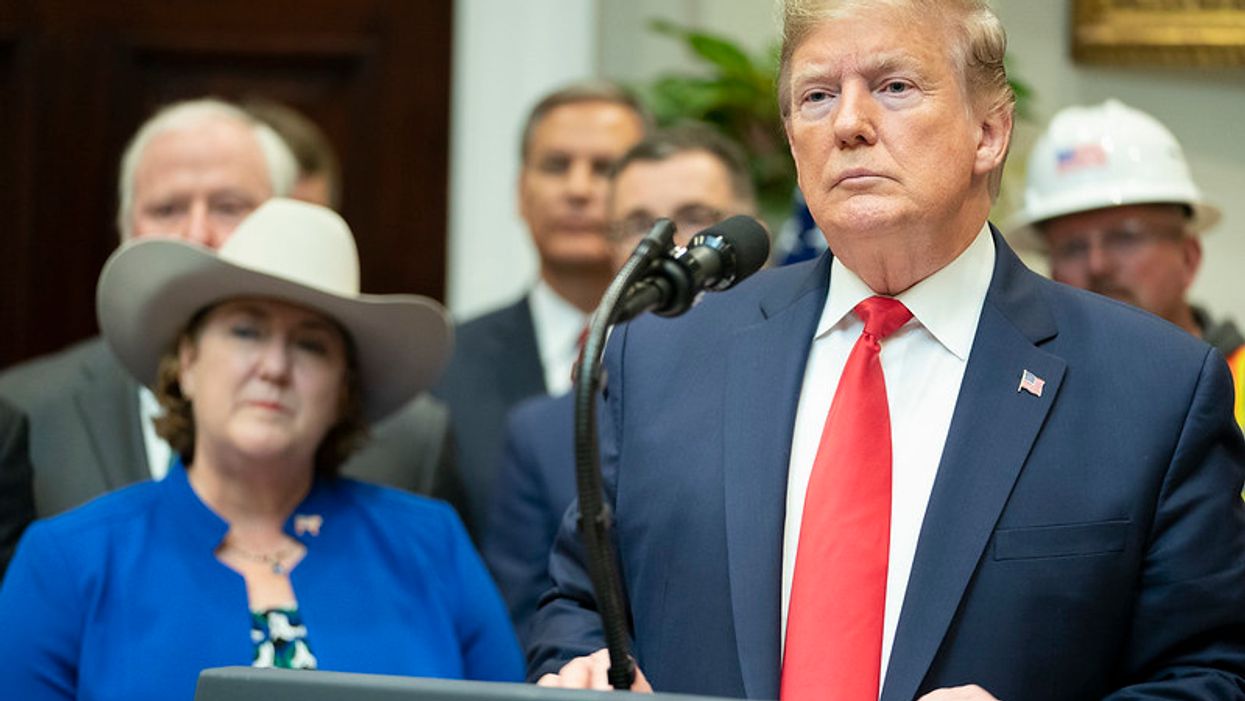
Reprinted with permission from Alternet
When President Donald Trump stood before the country last week and delivered his first press conference on the coronavirus crisis, my first reaction was to declare that his utter ignorance of public health was on display. And indeed, since then, the shallowness of his knowledge on the topic has only been exposed further.
But one line from Trump's first conference — called out at the time as preposterous and since then as deeply misguided — stands out now as the crisis has grown. He was addressing the number of cases of the infection in the United States when he said:
And again, when you have 15 people, and the 15 within a couple of days is going to be down to close to zero, that's a pretty good job we've done.
Even then, Trump's obsession with the figure "15" was just wrong. As Health and Human Services Secretary Alex Azar had explained earlier in the press conference, there were 15 Americans who had been detected to have the virus while within the United States. Another three cases involved Americans in the United States who had been diagnosed with the infection in Wuhan, China, and there were another 42 Americans who had been infected and discovered to have the disease while on a cruise ship from Japan.
So there were a total of sixty Americans in the country who had been found to have the virus; Trump was trying to downplay that number by focusing on a specific subset, clearly for PR reasons And just after the press conference, it was revealed that doctors had discovered the first case of the virus that had been transmitted within the United States.
Since then, Trump's optimistic statement that the cases would be "going to be down close to zero" has looked increasingly absurd. By Tuesday afternoon, the United States has now reported its ninth death from the virus as its spread continued. And there have now been a reported 118 cases of the infection in the United States, a number that is sure to climb, not decrease.
It's worse than Trump simply being wrong about exactly how big the crisis could become. Anyone can make a mistaken prediction, even when acting reasonably and in good faith. The problem is Trump seemed to misunderstand entirely the nature of the crisis he was facing and the ways in which his administration was slow to respond to it.
As MSNBC's Chris Hayes has been pointing out, one of the biggest failings of the administration's response to virus is in failing to have enough or sufficient testing. The CDC initially designed and used a test that is now believed to be flawed. New York state has sought to develop its own test to make up for these failures. There's also been mixed messages about the tests, with Azar saying days ago that 3,600 tests had been run, while the CDC was saying it had conducted fewer than 500 tests. But regardless of which figure was accurate, it was clear there hadn't been nearly enough testing for authorities to be confident about the spread thus far of the virus in the country, meaning they had even less reason to expect the number of cases should be declining soon. (And indeed, none of the experts shared Trump's prediction.)
Despite all this uncertainty, Trump did what he always does: lies. He misrepresented the meaning of the only numbers he had, numbers which anyone in the administration could have told him were not very informative, and then he fabricated his own projection of how the number of cases was likely to decline.
Trump's baseless optimism about the spread of the disease wasn't a one-off remark. He made similar rosy and shortsighted predictions throughout the press conference:
And we have a total of 15 cases, many of which, or most — within a day, I will tell you most of whom are fully recovered.
…
So we're at the low level. As they get better, we take them off the list, so that we're going to be pretty soon at only five people. And we could be at just one or two people over the next short period of time. So we've had very good luck.
And just as his focus on the "15" number was erroneous and discordant with the claims of others in the administration. Asked to respond to the Centers for Disease Controls and Prevention's report that the spread of the infection was inevitable, Trump told reporters:
Well, I don't think it's inevitable. It probably will. It possibly will. It could be at a very small level or it could be at a larger level. Whatever happens, we're totally prepared.
…
Now, it may get bigger, it may get a little bigger. It may not get bigger at all. We'll see what happens. But regardless of what happens, we are totally prepared.
It seemed pretty clear then that what the president was trying to do was calm the markets, which had already plunged on fears of a pandemic. But since investors are smart enough to see through the president's brazen attempts at manipulation, Trump's words did nothing to calm the markets. It's possible they only made things worse because they revealed that the head of the U.S. government is more interested in putting on a happy face than grappling with reality.
- A Case Of Negligent Homicide ›
- #EndorseThis: When Trump Told The Truth About Covid-19 (For Just Under One Minute) - National Memo ›
- As COVID Symptoms Worsen, Stricken Trump Takes Experimental Drug - National Memo ›
- Why We Should Hope Trump Survives His Bout With Covid-19 - National Memo ›
- Bizarre Trump ‘Joyride’ Exposes Secret Service Detail To Virus - National Memo ›
- Trump Echoes False Right-Wing Claims About Masks - National Memo ›
- With 219,000 Dead, Trump Says Media Are ‘Dumb Bastards’ For Reporting On Covid-19 - National Memo ›
- New COVID-19 Infections Explode As Trump Says We’re ‘Turning Corner’ - National Memo ›
- WATCH: Trump Takes Pandemic Victory Lap As Unchecked Surge Kills Thousands - National Memo ›
- Why You Can’t Get A Coronavirus Vaccine - National Memo ›








